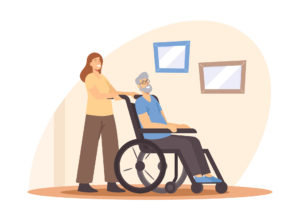Burnout. It is something you have most likely experienced, even if you couldn’t identify it. You know; the feeling of being in constant stress, being emotionally drained, and not being able to meet demands of tasks. This prolonged feeling continues, and you start to lose the ability and motivation to keep doing what you’re doing. It feels like you’re spiraling out of control and the exhaustion is too much, but you don’t know how to make it all stop – so you just physically stop. You give up.
Most people pair the idea of burnout with work. Work is a high stress situation for most and since the pandemic hit and the staffing crisis happened, it seems as if one person is doing three people’s job. However, you can experience burnout in any part of life. One part that isn’t talked about often enough is caregiver burnout.
Caregiver burnout is a touchier subject for most. Why? Because it involves another human who is depending on you. You have the added stress of feeling like you failed another person on top of your own emotions. Caregiver burnout tends to happen when the caregiver isn’t getting what they need. It sounds cheesy but the idea that you can’t fill someone else’s cup if yours is empty is true. Therefore, we have compiled a list of tips and tricks on how to help combat caregiver burnout.
- Make time for yourself: Something that sounds so simple is often one of the first things we give up. Weather you spend quiet time with your morning coffee, you hit the gym, or you journal, it is vital that you make time for yourself. Take time for you each day by setting aside at least 20 minutes. You must take care of yourself to take care of others.
- Connect with other caregivers: Isolation is the easiest place to put yourself in. But in today’s day and age you don’t even have to leave your house to find a group. Social media has made it possible to find a support system online. If you’re more of an in-person type of person, do a quick Google search on support systems near you. Having people to connect with over a common topic makes you feel less alone.
- Take breaks: Don’t forget to take breaks throughout the day. Go for a walk around your neighborhood or take an extra-long bath. Schedule a movie to see with friends, go out to dinner, or go shopping. Whatever it is you like to do – do it. It is important to recharge and schedule time away so you can just be.
- Take trips: This one might sound weird, but schedule weekend getaways or a week-long vacation. This helps you recharge. You can investigate respite care or hospice care for when you are gone. Start small with a couple hour drive getaway too fit your comfort level. But don’t forget to live your life – you’re loved one would want it this way.



